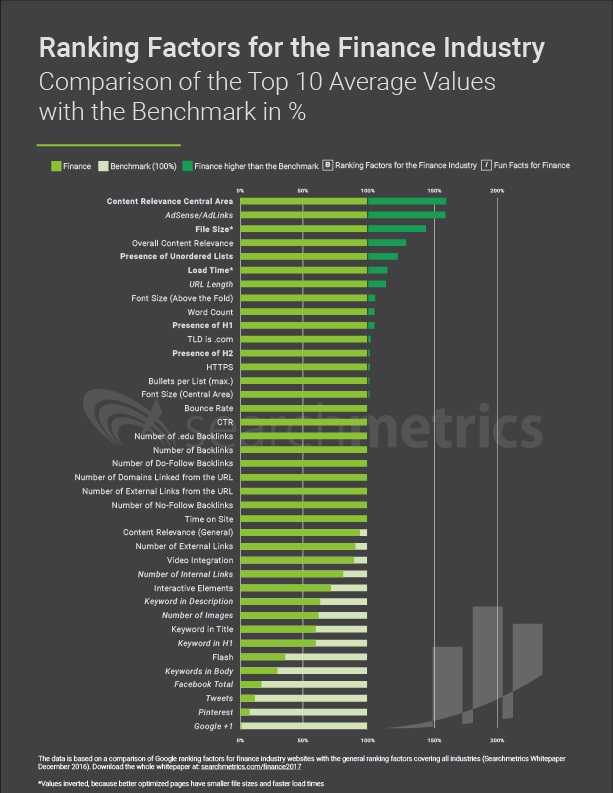Google’s use of machine learning has improved search results, but it also means that banks, insurance and other financial services brands must get even smarter about industry SEO rules, according to a new report.

New research by Searchmetrics addresses this challenge by identifying key industry-specific factors that are commonly found on financial services websites that rank higher in Google searches. Among the main findings:
- having highly relevant content is even more important in financial services than in other sectors (financial services content that ranks higher in Google searches is 50% more relevant to the entered search query)
- top ranking financial website pages tend to be more streamlined, loading a second faster than other high-ranking pages and may even use fewer images and videos
- financial services related web pages use the searched keyword or phrase far less in the text than other websites that rank highly (so performing well in search relies even less on creating content that repeats keywords entered by searchers)
- pages that tend to rank high in financial services tend to have 29% fewer buttons, menus or other interactive elements than can lead visitors to other parts of the site (the focus in finance is more on helping visitors absorb the content on the current page)
- plus financial services web pages that rank high on Google are 70% more likely to be shared or engaged with on LinkedIn (than other content that ranks highly). But financial content is less popular on Facebook
The findings are based on an analysis of Google.com search results for 6,000 finance related keywords (using terms that people typically use to search for financial services products, services and information).
The study suggests that financial brands can no longer rely solely on general, widely applicable search and content optimization strategies to help their content rank higher on Google: they now need to do a variety of industry-specific things that are important for ranking well in finance searches.
This is because machine learning and other technologies are helping Google to better understand the intention behind the words people enter in to the search bar, allowing it to deliver more relevant, industry-specific results.
The study also reveals that financial services web pages that rank high on Google are 70% more likely to be shared or engaged with on LinkedIn (than other content that ranks highly). But financial content is less popular on Facebook.
The insights come from Searchmetrics, a specialist in search and content optimization, which analyzed the top 20 Google search results for over 6,000 finance-related keywords (including terms such as ‘mortgage rates’, ‘Insurance’ and ‘foreign exchange’) to identify the most commonly occurring elements, important Ranking Factors as well as features where finance stands out. The findings were compared with a broader Searchmetrics benchmark study that analyzed the results of 10,000 general search queries applicable across all industries. The research is summarized in the whitepaper: Finance Ranking Factors – Data Insights for Performing on Google’.
“If you are a financial services organization, it’s essential to rank well within search engines. That’s where most customers start their research for everything from mortgages and loans to investing in stocks,” explains Marcus Tober, founder and CTO at Searchmetrics. “But financial brands can no longer rely solely on general, widely applicable search and content optimization strategies to help their content rank higher. Our study shows they now need to do a variety of industry-specific things that are important for ranking well in finance searches.”
According to Tober, this is because Google is getting smarter. With the help of machine learning and other technologies, the search engine now has a greater understanding of the intention behind the words people enter in to the search bar, allowing it to deliver more relevant, industry-specific results. For example, Google can identify if queries relate to finance, travel or other vertical sectors and displays results that use elements that most effectively address the needs of searchers within those individual categories.

Below are five key learnings from the Searchmetrics study that can help finance brands rank higher on Google.
- Content relevance is even more important in financial services
Pages that rank in the top ten Google results for financial services searches have a higher content relevance than the top ten results for general search queries (that Searchmetrics analyzed in its benchmark study).
The company measures content relevance¹ using Big Data computing to compare the semantic relation of the words people enter into the search bar with both related topics and the text that appears in the pages listed in search results.
In fact, the study found that Google’s top ten results for financial services queries have a content relevance score for the central part of the page that is 50% higher on average than the most relevant content found in the general benchmark study.
- Frequently mentioning keywords is not necessary
High-ranking financial services content uses the searched keyword three times less frequently in the body text than high ranking content in the benchmark study. Across the first 20 positions, the keyword only appears on the page 2.1 times, whereas for general search queries the overall average is 7.4: more than three times as many.
Repeating the same words can come across as unnatural to website visitors and it’s likely that in financial services searches Google is putting even greater emphasis on rewarding sites that provide content that is easy to understand and uses natural language to answer searchers’ questions.
- Hold off on menus, buttons and other interactive elements on the page
Of all the industries analyzed by Searchmetrics, financial services pages ranking on Google’s first page have the fewest interactive elements such as buttons and menus: 29% below the benchmark average. This strongly suggests that the focus for pages ranking for finance-related topics is on helping visitors to absorb the content on the page, and not on navigational elements such as buttons or menus than can lead visitors to other parts of the site. This makes good sense as complex finance-related content often requires visitors to focus.
- Keep file sizes small ‒ for example by using fewer images and videos
The file sizes of top 10 results in financial services searches are around 30% smaller than the overall average. One explanation is that pages that provide information related to finance tend to make less use of images and/or videos that can produce bigger pages. This also ties in with why financial services results tend to load a second quicker on average.
Interestingly, while video is a great way to capture website visitors’ attention, some studies suggest that when people are making important, complex decisions such as choosing a mortgage or insurance product, text works better.
- Top financial content drives more LinkedIn interactions than other topics
The top 20 results in finance searches attract just a fifth as many Facebook likes and shares as the benchmark average. However, they have 70% more social signals from the professional network LinkedIn. While there is no proof of a causal link between greater LinkedIn or Facebook engagement and higher rankings, the study does suggest that sites ranking higher for finance-related queries are also very popular among LinkedIn users. So LinkedIn as a professional social network seems to be a relevant social channel for finance topics.
To download ‘Finance Ranking Factors – Data Insights for Performing on Google’ visit: www.searchmetrics.com/knowledge-base/ranking-factors-finance/.
This is one of a series of Searchmetrics industry-specific ranking factors studies focusing on individual verticals. You can download its analysis of eCommerce ranking factors here and expect to see further studies on the travel, media and health verticals in the coming months.
www.searchmetrics.com
